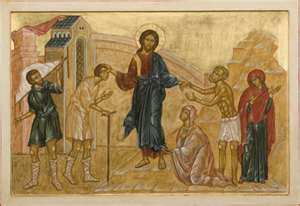|
|||
|---|---|---|---|
| This weekly bulletin insert complements the curriculum published by the Department of Christian Education of the Orthodox Church in America. This and many other Christian Education resources are available at http://dce.oca.org. | |||

In Romans 15: 1-7 Saint Paul writes that we who are strong should bear with the failings of the weak. But the term "bear with" means more than what we often take it to mean, a kind of polite putting up with others. Paul shows us an expanded meaning by quoting Psalm 69:9 as applying to Jesus Christ: "The reproaches of those who reproached you fell on me." The "me" is Christ, who bore insults, or reproaches, that humanity was too weak to bear. He carried the burdens of humanity's failures and weaknesses. The whole 9th chapter shows how Christ bore with human weaknesses and failings. In the early verses of Chapter 9, the Pharisees have made the insulting accusation that He is a blasphemer, and have questioned His practice of eating with tax collectors and sinners. In their superficial understanding, they rush to accuse with hostile questions rather than acknowledge miraculous healings. Jesus continues His work despite the insults. He heals a woman with a debilitating hemorrhage, then raises the dead daughter of a ruler of the synagogue. Though the crowds have seen previous miracles, they show the feebleness of their faith by laughing at Him when He says that the girl is "not dead but sleeping." But the girl's father, like the woman with a hemorrhage, has shown real faith and that, not the crowd's weak faith and derisive laughter, draws Jesus' attention and effort. Verses 27-35 tell the story of two blind men who ask Jesus to heal them. This time, He asks them directly about their faith: "Do you believe that I am able to do this?" When they answer that they do believe, He touches their eyes, heals them, and says, "According to your faith be it done to you." But human weakness is evident again. The two men gladly accept the healing, but are not strong enough to obey Christ's "stern" charge that they not tell anyone. Instead they go and "spread His fame throughout all that district." Then, when He encounters and restores a demon-possessed person who cannot speak, the Pharisees react with another insult: "He casts out demons by the prince of demons." In Chapter 9's final verses, Jesus tells why He bears with His people despite all their insults and faintness of heart. He knows they are "harassed and helpless, like sheep without a shepherd." He also knows there is work to do—the work of salvation—and tells His disciples to pray that God the Father will send "laborers into His harvest." Saint Paul, who also bore with others' insults and weakness, gives similar reasons for carrying on his work. He says that we bear with our neighbor "for his good" (Romans 15: 2). We work with steadfastness, encouraged by the Scriptures, so that "with one voice" we may glorify the God and Father of Our Lord Jesus Christ. We work so that we all, together, may be saved. |
|||
